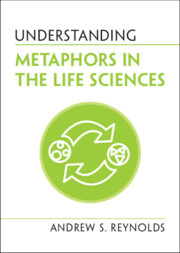Book contents
- Understanding Metaphors in the Life Sciences
- Series page
- Understanding Metaphors in the Life Sciences
- Copyright page
- Additional material
- Dedication
- Contents
- Foreword
- Preface
- Acknowledgements
- 1 Metaphors and Science
- 2 Background Metaphors
- 3 Genes and Genomes
- 4 Proteins
- 5 Cells
- 6 Evolution
- 7 Ecology
- 8 Biomedicine
- Concluding Remarks
- Summary of Common Misunderstandings
- References
- Index
1 - Metaphors and Science
Published online by Cambridge University Press: 11 April 2022
- Understanding Metaphors in the Life Sciences
- Series page
- Understanding Metaphors in the Life Sciences
- Copyright page
- Additional material
- Dedication
- Contents
- Foreword
- Preface
- Acknowledgements
- 1 Metaphors and Science
- 2 Background Metaphors
- 3 Genes and Genomes
- 4 Proteins
- 5 Cells
- 6 Evolution
- 7 Ecology
- 8 Biomedicine
- Concluding Remarks
- Summary of Common Misunderstandings
- References
- Index
Summary
Metaphor has traditionally been considered antithetical to science. Metaphorical speech, which is commonly associated with the creative wordplay of poetry and fiction, would seem after all to be at cross-purpose to scientists’ efforts to articulate clear, rigorously precise, and objective statements of fact about reality. Aside from a tendency toward obscurity, the greater problem is that metaphorical expressions are typically false, literally speaking. Shakespeare’s Juliet is not literally the sun, time does not literally flow, and the genome is not a literal blueprint, book, or program. It is principally for this reason that scientists and philosophers of science have been, until rather recently, very critical of the suggestion that metaphor might play a legitimate role in the scientific process. In the early modern period, philosophers like Francis Bacon, Thomas Hobbes, and John Locke, who were enthusiastic advocates of the new scientific approach to understanding the world so brilliantly illustrated by the likes of Hooke, Boyle, and Newton, made withering criticism of metaphor as productive of nothing but falsehood and misdirection.
- Type
- Chapter
- Information
- Understanding Metaphors in the Life Sciences , pp. 1 - 13Publisher: Cambridge University PressPrint publication year: 2022
- 2
- Cited by

